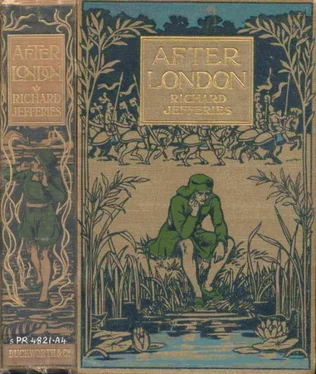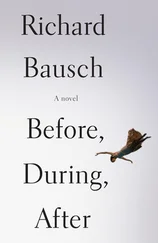Richard Jefferies - After London
Здесь есть возможность читать онлайн «Richard Jefferies - After London» весь текст электронной книги совершенно бесплатно (целиком полную версию без сокращений). В некоторых случаях можно слушать аудио, скачать через торрент в формате fb2 и присутствует краткое содержание. Город: London, Год выпуска: 1905, Издательство: Duckworth & Co., Жанр: sf_postapocalyptic, на английском языке. Описание произведения, (предисловие) а так же отзывы посетителей доступны на портале библиотеки ЛибКат.
- Название:After London
- Автор:
- Издательство:Duckworth & Co.
- Жанр:
- Год:1905
- Город:London
- ISBN:нет данных
- Рейтинг книги:4 / 5. Голосов: 1
-
Избранное:Добавить в избранное
- Отзывы:
-
Ваша оценка:
- 80
- 1
- 2
- 3
- 4
- 5
After London: краткое содержание, описание и аннотация
Предлагаем к чтению аннотацию, описание, краткое содержание или предисловие (зависит от того, что написал сам автор книги «After London»). Если вы не нашли необходимую информацию о книге — напишите в комментариях, мы постараемся отыскать её.
(1885), set in a future in which urban civilization has collapsed after an environmental crisis.” (From
).
This eBook is for the use of anyone anywhere at no cost and with almost no restrictions whatsoever. You may copy it, give it away or re-use it under the terms of the Project Gutenberg License included with this eBook or online at
* * *
After London — читать онлайн бесплатно полную книгу (весь текст) целиком
Ниже представлен текст книги, разбитый по страницам. Система сохранения места последней прочитанной страницы, позволяет с удобством читать онлайн бесплатно книгу «After London», без необходимости каждый раз заново искать на чём Вы остановились. Поставьте закладку, и сможете в любой момент перейти на страницу, на которой закончили чтение.
Интервал:
Закладка:
With a heavy heart, Felix took his paddle and stepped overboard. Feeling with the paddle, he plumbed the depth in front of him, and, as he expected, walked all the way to the shore, no deeper than his knees. This was fortunate, as it enabled him to convey his things to land without loss. He wrapped up the tools and manuscripts in one of his hunter’s hides. When the whole cargo was landed, he sat down sorrowfully at the foot of the cliff, and looked out at the broken mast and sail, still flapping uselessly in the breeze.
It was a long time before he recovered himself, and set to work mechanically to bury the crossbow, hunter’s hides, tools, and manuscripts, under a heap of pebbles. As the cliff, though low, was perpendicular, he could not scale it, else he would have preferred to conceal them in the woods above. To pile pebbles over them was the best he could do for the present; he intended to return for them when he discovered a path up the cliff. He then started, taking only his bow and arrows.
But no such path was to be found; he walked on and on till weary, and still the cliff ran like a wall on his left hand. After an hour’s rest, he started again; and, as the sun was declining, came suddenly to a gap in the cliff, where a grassy sward came down to the shore. It was now too late, and he was too weary, to think of returning for his things that evening. He made a scanty meal, and endeavoured to rest. But the excitement of losing the canoe, the long march since, the lack of good food, all tended to render him restless. Weary, he could not rest, nor move farther. The time passed slowly, the sun sank, the wind ceased; after an interminable time the stars appeared, and still he could not sleep. He had chosen a spot under an oak on the green slope. The night was warm, and even sultry, so that he did not miss his covering, but there was no rest in him. Towards the dawn, which comes very early at that season, he at last slept, with his back to the tree. He awoke with a start in broad daylight, to see a man standing in front of him armed with a long spear.
Felix sprang to his feet, instinctively feeling for his hunting-knife; but he saw in an instant that no injury was meant, for the man was leaning on the shaft of his weapon, and, of course, could, if so he had wished, have run him through while sleeping. They looked at each other for a moment. The stranger was clad in a tunic, and wore a hat of plaited straw. He was very tall and strongly built; his single weapon, a spear of twice his own length. His beard came down on his chest. He spoke to Felix in a dialect the latter did not understand. Felix held out his hand as a token of amity, which the other took. He spoke again. Felix, on his part, tried to explain his shipwreck, when a word the stranger uttered recalled to Felix’s memory the peculiar dialect used by the shepherd race on the hills in the neighbourhood of his home.
He spoke in this dialect, which the stranger in part at least understood, and the sound of which at once rendered him more friendly. By degrees they comprehended each other’s meaning the easier, as the shepherd had come the same way and had seen the wreck of the canoe. Felix learned that the shepherd was a scout sent on ahead to see that the road was clear of enemies. His tribe were on the march with their flocks, and to avoid the steep woods and hills which there blocked their course, they had followed the level and open beach at the foot of the cliff, aware, of course, of the gap which Felix had found. While they were talking, Felix saw the cloud of dust raised by the sheep as the flocks wound round a jutting buttress of cliff.
His friend explained that they marched in the night and early morning to avoid the heat of the day. Their proposed halting-place was close at hand; he must go on and see that all was clear. Felix accompanied him, and found within the wood at the summit a grassy coombe, where a spring rose. The shepherd threw down his spear, and began to dam up the channel of the spring with stones, flints, and sods of earth, in order to form a pool at which the sheep might drink. Felix assisted him, and the water speedily began to rise.
The flocks were not allowed to rush tumultuously to the water; they came in about fifty at a time, each division with its shepherds and their dogs, so that confusion was avoided and all had their share. There were about twenty of these divisions, besides eighty cows and a few goats. They had no horses; their baggage came on the backs of asses.
After the whole of the flocks and herds had been watered several fires were lit by the women, who in stature and hardihood scarcely differed from the men. Not till this work was over did the others gather about Felix to hear his story. Finding that he was hungry they ran to the baggage for food, and pressed on him a little dark bread, plentiful cheese and butter, dried tongue, and horns of mead. He could not devour a fiftieth part of what these hospitable people brought him. Having nothing else to give them, he took from his pocket one of the gold coins he had brought from the site of the ancient city, and offered it.
They laughed, and made him understand that it was of no value to them; but they passed it from hand to hand, and he noticed that they began to look at him curiously. From its blackened appearance they conjectured whence he had obtained it; one, too, pointed to his shoes, which were still blackened, and appeared to have been scorched. The whole camp now pressed on him, their wonder and interest rising to a great height. With some trouble Felix described his journey over the site of the ancient city, interrupted with constant exclamations, questions, and excited conversation. He told them everything, except about the diamond.
Their manner towards him perceptibly altered. From the first they had been hospitable; they now became respectful, and even reverent. The elders and their chief, not to be distinguished by dress or ornament from the rest, treated him with ceremony and marked deference. The children were brought to see and even to touch him. So great was their amazement that any one should have escaped from these pestilential vapours, that they attributed it to divine interposition, and looked upon him with some of the awe of superstition. He was asked to stay with them altogether, and to take command of the tribe.
The latter Felix declined; to stay with them for awhile, at least, he was, of course, willing enough. He mentioned his hidden possessions, and got up to return for them, but they would not permit him. Two men started at once. He gave them the bearings of the spot, and they had not the least doubt but that they should find it, especially as, the wind being still, the canoe would not yet have broken up, and would guide them. The tribe remained in the green coombe the whole day, resting from their long journey. They wearied Felix with questions, still he answered them as copiously as he could; he felt too grateful for their kindness not to satisfy them. His bow was handled, his arrows carried about so that the quiver for the time was empty, and the arrows scattered in twenty hands. He astonished them by exhibiting his skill with the weapon, striking a tree with an arrow at nearly three hundred yards.
Though familiar, of course, with the bow, they had never seen shooting like that, nor, indeed, any archery except at short quarters. They had no other arms themselves but spears and knives. Seeing one of the women cutting the boughs from a fallen tree, dead and dry, and, therefore, preferable for fuel, Felix naturally went to help her, and, taking the axe, soon made a bundle, which he carried for her. It was his duty as a noble to see than no woman, not a slave, laboured; he had been bred in that idea, and would have felt disgraced had he permitted it. The women looked on with astonishment, for in these rude tribes the labour of the women was considered valuable and appraised like that of a horse.
Читать дальшеИнтервал:
Закладка:
Похожие книги на «After London»
Представляем Вашему вниманию похожие книги на «After London» списком для выбора. Мы отобрали схожую по названию и смыслу литературу в надежде предоставить читателям больше вариантов отыскать новые, интересные, ещё непрочитанные произведения.
Обсуждение, отзывы о книге «After London» и просто собственные мнения читателей. Оставьте ваши комментарии, напишите, что Вы думаете о произведении, его смысле или главных героях. Укажите что конкретно понравилось, а что нет, и почему Вы так считаете.












